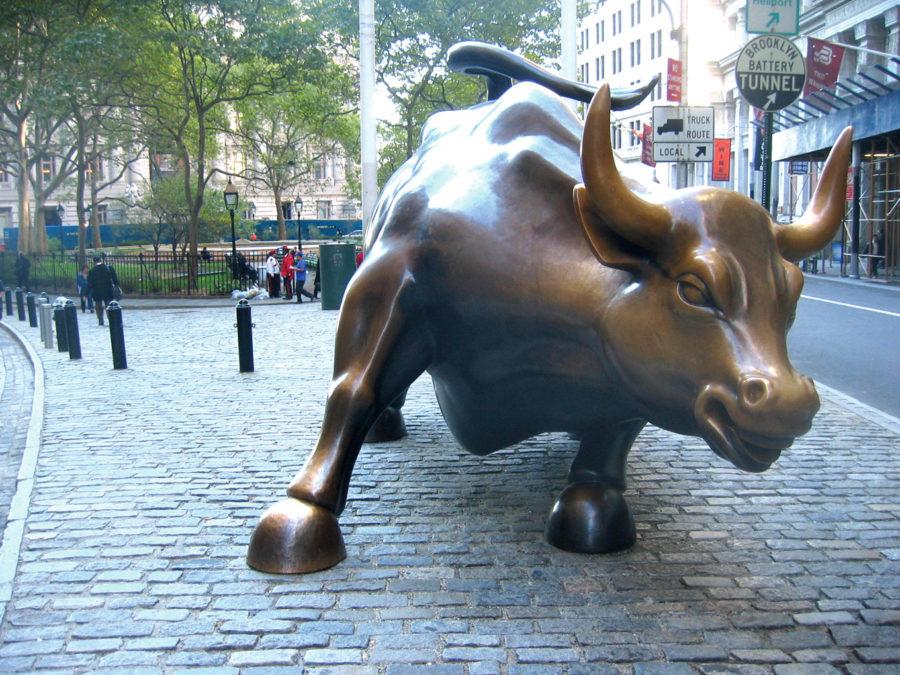Witte: American capitalism is hardly free
Photo courtesy of Douglas LeMoine/Flickr
Wall Street Bull
January 20, 2012
How free is the American style of capitalism? The commonly held belief is that anyone can succeed in any field if they try hard enough. You can start a business and prevail if you have a successful business model and enough capital to start and maintain growth. However, it seems that American capitalism is less free than many seem to believe. And despite the pundits and politicians screaming about too much regulation or too much government intervention in terms of “leftist” or “socialist” regulation, it is more so a problem with crony capitalism.
Crony capitalism is a situation in which business leaders get special breaks such as tax breaks, grants and other perks from government officials they are close to. Under this style of economics, larger businesses — because they have a significant amount of clout in the form of money and power — are substantially more able to reap big profits compared to the small business owner. Thus, small businesses either fail quickly or, if they do become successful and threaten to impede on the larger business, are either bought out quickly or starved to death by the larger businesses lowering prices.
This marriage of business leaders and government is detrimental to free-market economics and is a stain on what capitalism is supposed to be. The “founding fathers” of free-market economics stressed that local markets should sustain communities in a responsible manner. The very thought of monopolies or companies deemed “too big to fail” was scorned at. Many giant corporations today that were started in America got to be the size they did because, at the time of the creation of their business, few laws or regulations were around in that field. This allowed them to grow at a nearly uncontrollable rate, take advantage of labor, buy out competitors and pollute heavily.
Then, because of their influence on political leaders, many companies were able to get legislation written that helped their company succeed or get politicians to ignore legislation to allow them to create monopolies. One example is the Carnegie Steel Company, which was able to purchase many other steel companies and become the largest steel company in America. This largely occurred before the Sherman Anti-Trust Act, in a time when there were hardly any government regulations of business.
Another example would be the Interstate Commerce Commission, an 1887 bill that aimed to regulate the railroad and the so-called “robber-barons.” However, the commission quickly became under the control of the same robber-barons it meant to regulate. This led to a price-fixing scheme that created permits that were used to allow or deny access to new companies onto the railroads.
A more current example is the passage of the Financial Services Modernization Act of 1999, which was a major bill that allowed Citicorp and Travelers Group to merge and form Citigroup and to marry commercial and investment banking, acts which had been outlawed for more than 60 years. This bill, co-sponsored by former Iowa Republican Rep. Jim Leach, has been cited as one of the major causes of the Great Recession by many economists.
Another aspect of crony capitalism takes us to what is known as the “revolving door” between business and government. This is when an individual — usually a higher-up member of a business, lobbying group or other private entity — is appointed to a regulatory position within a department of government, usually in the same field as their previous position. Dick Cheney, for example, was the Secretary of Defense during the first Gulf War, then became CEO of Halliburton, one of the largest oil companies on the planet. He then was elected to the office of the vice president of the United States, becoming a major contributor to the decision to invade Iraq, an oil-rich country as we all know.
Another example would be Michael Taylor, the current deputy commissioner of the Food and Drug Administration appointed by President Barack Obama. Taylor spent decades as a lawyer for Monsanto and, in the same FDA position in the Clinton administration, was responsible for approving rBGH (recombinant bovine growth hormone, produced by Monsanto) use in America. This growth hormone, when consumed through dairy products, is known to increase by seven times the risk of breast, prostate and colon cancer. It is currently banned in Canada, New Zealand, Australia and the entire European Union.
The revolving door between government and business is unfair because it essentially creates a situation of the fox guarding the henhouse. Being regulated (or a lack thereof) by the same people who are supposed to be the ones being regulated creates a perpetual system in which special breaks and legislation are given to the same companies and disallows competition and new companies to start up and get an ever-so-valuable foothold in a market.

















